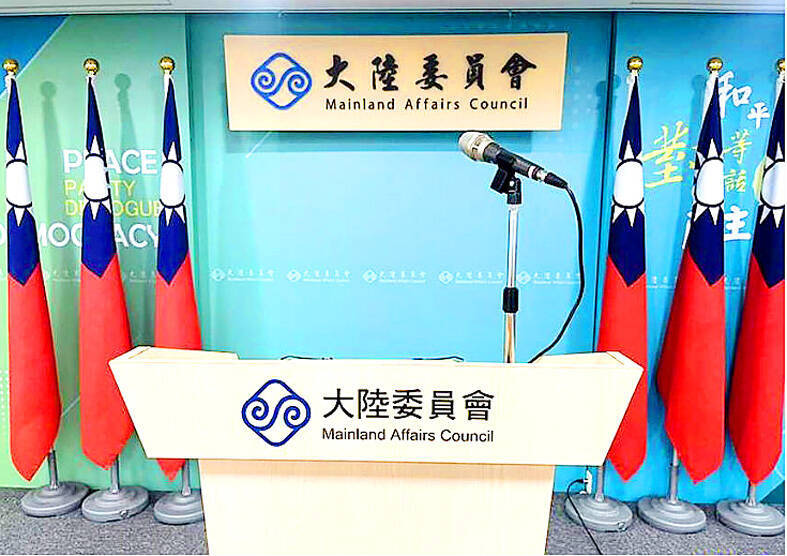The government’s position of welcoming Chinese tourists remains unchanged, the Mainland Affairs Council said yesterday, following Shanghai Deputy Mayor Hua Yuan’s (華源) comments that the city administration would promote group tours to Taiwan.
“People across the Taiwan Strait are a family. The more frequently we visit each other, the closer we become,” Hua told the participants of the annual Taipei-Shanghai Twin-City Forum in Taipei.
“I invite Taiwanese to visit Shanghai and hope Shanghainese can visit Taiwan more often. We will promote group tours to Taiwan among Shanghai residents, and travel itineraries would definitely include Taipei,” he said.

Photo: Taipei Times
Hua’s statement was perceived as a signal that China would soon allow Shanghai residents to visit Taiwan.
The Chinese Ministry of Culture and Tourism in August gave permission to residents of China’s Fujian Province to visit Kinmen and Lienchiang (Matsu) counties. Beijing still imposes a travel ban on Taiwan proper.
“We are not sure whether the Chinese Ministry of Culture and Tourism or Shanghai has the final say [in lifting the travel ban to Taiwan]. Nevertheless, the government’s position of welcoming the arrival of Chinese tourists remains unchanged,” the council said in a statement.
The council said it had on Aug. 24 announced plans of resuming cross-strait tourism, and agencies are ready to do that.
It said it is waiting for an official announcement of details from the Chinese Ministry of Culture and Tourism.
China’s Taiwan Affairs Office last month said Beijing would consider lifting the travel ban to Taiwan proper and Penghu County if the Taiwanese government lifts a ban on group tours to China and removes what it calls the barriers impeding exchanges and partnerships for people across the Taiwan Strait.
The Ministry of Transportation and Communications said that Beijing has yet to show any goodwill in terms of tourism, as more Taiwanese visit China than Chinese visiting Taiwan.
China allows its Fujian residents to visit Matsu and Kinmen individually or in groups, the Tourism Administration Director-General Chou Yung-hui (周永暉) said, adding that the administration welcomes tourists from other provinces as well.
“We continue to implement cross-strait tourism exchange in accordance with the principle of reciprocity and review the policy by taking into account the status quo,” he said.
High Quality of Travel Association public relations representative Ringo Lee (李奇嶽) said that travel operators are ready to accept Chinese tourists.
“We also hope that the government would soon lift the group tour ban to China, and in doing so the cross-strait tourism would continue to develop in a normal direction,” Lee said.
Chinese tourists used to spend about seven to eight days traveling in Taiwan, regardless of which airport they entered, he said.
While all international tourists would visit Taipei during their tours in Taiwan, a majority of them — 80 percent — would only stay in the capital, Lee said.
Chinese tourists were more likely than others to travel to tourist attractions in central, southern and eastern Taiwan, and their visits can directly help tourism in those regions, he said.
How much Taiwan would benefit from the visits of Shanghai tourists depends on the tension between Taiwan and China, Lee said, adding that more Chinese tourists would come if tensions ease.

“China is preparing to invade Taiwan,” Deputy Minister of Foreign Affairs Francois Wu (吳志中) said in an exclusive interview with British media channel Sky News for a special report titled, “Is Taiwan ready for a Chinese invasion?” the Ministry of Foreign Affairs said today in a statement. The 25-minute-long special report by Helen Ann-Smith released yesterday saw Sky News travel to Penghu, Taoyuan and Taipei to discuss the possibility of a Chinese invasion and how Taiwan is preparing for an attack. The film observed emergency response drills, interviewed baseball fans at the Taipei Dome on their views of US President

The Central Weather Administration (CWA) today issued a "tsunami watch" alert after a magnitude 8.7 earthquake struck off the Kamchatka Peninsula in northeastern Russia earlier in the morning. The quake struck off the east coast of the Kamchatka Peninsula at 7:25am (Taiwan time) at a depth of about 19km, the CWA said, citing figures from the Pacific Tsunami Warning Center. The CWA's Seismological Center said preliminary assessments indicate that a tsunami could reach Taiwan's coastal areas by 1:18pm today. The CWA urged residents along the coast to stay alert and take necessary precautions as waves as high as 1m could hit the southeastern

The National Museum of Taiwan Literature is next month to hold an exhibition in Osaka, Japan, showcasing the rich and unique history of Taiwanese folklore and literature. The exhibition, which is to run from Aug. 10 to Aug. 20 at the city’s Central Public Hall, is part of the “We Taiwan” at Expo 2025 series, highlighting Taiwan’s cultural ties with the international community, National Museum of Taiwan Literature director Chen Ying-fang (陳瑩芳) said. Folklore and literature, among Taiwan’s richest cultural heritages, naturally deserve a central place in the global dialogue, Chen said. Taiwan’s folklore would be immediately apparent at the entrance of the

ECONOMIC BENEFITS: The imports from Belize would replace those from Honduras, whose shrimp exports have dropped 67 percent since cutting ties in 2023 Maintaining ties with Taiwan has economic benefits, Ministry of Foreign Affairs officials said yesterday, citing the approval of frozen whiteleg shrimp imports from Belize by the Food and Drug Administration (FDA) as an example. The FDA on Wednesday approved the tariff-free imports from Belize after the whiteleg shrimp passed the Systematic Inspection of Imported Food, which would continue to boost mutual trade, the ministry said. Taiwan’s annual consumption of whiteleg shrimps stands at 30,000 tonnes, far exceeding domestic production, the ministry said. Taiwan used to fill the gap by importing shrimps from Honduras, but purchases slumped after Tegucigalpa severed diplomatic ties with Taiwan